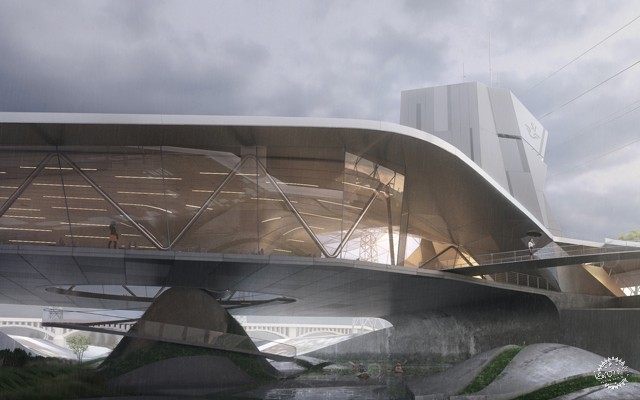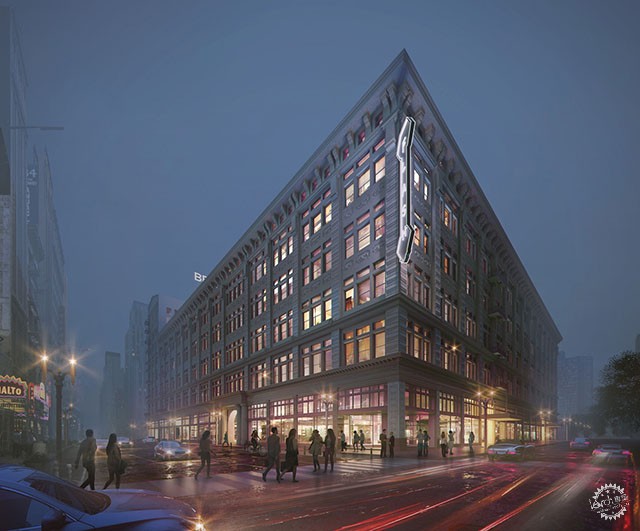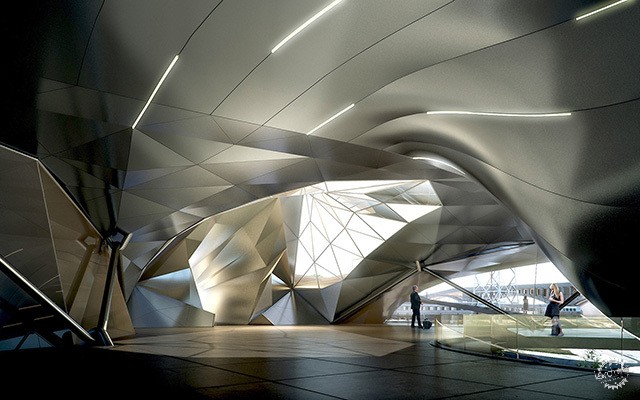
Virtual Reality vs Film: What Are the Benefits of Each When Presenting Building Designs?
由专筑网Vigo,刘庆新编译
夸张的虚拟手法混合真实场景融入到不断进化的视觉方式激起了关于我们建筑预览的话题。位于洛杉矶的Shimahara Illustration 公司探讨了新技术与传统CG电影动画的基本差异性。
大部分的VR/AR/MR虚拟场景都根据创作者而改变。在影片里,观众现在也可以根据目录的提供选择背景。原因非常简单,在VR里,你是一个用户,在影片里,你是一个导演。
那么,问题来了:谁对故事情节负责? 在虚拟世界中,用户创造故事,虽然只是在所制作的场景中漫步。VR可能被看作是一系列的探索发现而不是真正的有序列的剧情创作。无论如何,这与影片式的叙述有着截然不同的差别。在影片里或者动画里,场景被创作出来,并加入音乐还有一系列的意向给观众传递某些信息。
Virtual, Augmented, and Mixed-Reality add to an evolving spectrum of visualization tools that have invigorated the dialogue around how we pre-experience architecture. Los Angeles-based Shimahara Illustration discusses a fundamental difference between these new technologies and traditional CG film/animation.
Much of the fascination with VR/AR/MR lies in the shifting authorship of experience. The audience is now in control of the Mise-en-scène which yields a categorically different experience than when viewing a film. The reason is simple: with VR you have a user; with film you have an auteur.
The distinction comes down to the question: who is responsible for producing the narrative? Within virtual reality the user is the one creating the story, albeit as a kind of meandering by-product of exploration. The VR experience might be thought of more as a process of discovery than of actual story-making in a linear sense. In any case, it is in sharp contrast with the cinematic choreography offered by the filmmaker’s work. With a film or animation scenes are composed, sequenced, and timed to music with the collective intention of leading an audience towards a specific message.

Courtesy of Shimahara Illustration
尽管一直抵制在场景里植入某种观念,但请铭记在适当的情景使用合适的工具和手法。当人们可以在自由平和的虚拟世界里游览的时候,更像是一个建筑设计的过程。但是,对于同样的建筑,在某些特殊时候需要被更精确的定义,例如,品牌化,资本募款或者获取委托时。因此,传统的动画可以为这样的设定提供合适的场景。
对比建筑动画或电影里,时刻谨记部署很重要。那样,很多潜在用户可能并不喜欢被场景设置所限制住的VR经验,而CG影片通常又是通过网络所共享的。如果媒体是某种信息,暗含的意义可能影响我们在参与面对面沟通或者广泛高效远程沟通的排斥或信任的选择,那么我们对这两种方式的判断都过于草率了。
It’s important to resist placing a value outright on one option over the other, but instead to keep the distinction of authorship in mind in order to help match the right tool with a given situation. There is likely a moment along any building design schedule when it would be valuable to allow the audience to preview a space with the kind of freedom and neutrality that VR affords. Yet, for the same building there are instances when a more precise set of ideas are important to communicate, like branding, capital campaigns, or winning the commission in the first place. Here, traditional animation might provide the appropriate solution.
Deployment is another factor to keep in mind when comparing virtual reality to an architectural film or animation. At the moment, many would-be users are not set up to support a robust VR experience which can limit deployment to a few physical locations, while CG films and animations are ubiquitous and shared routinely via online links and social media. Again, hold snap judgments on either option, for if it's true that the medium is the message then an undercurrent of value may run beneath each choice (ie. perception of exclusivity versus dependability; engaging face time with a client versus widespread and efficient accessibility).

Courtesy of Shimahara Illustration
大多数成熟的建筑表现公司可以在设计阶段提供很多问题的解决方法。尤其在最近二十年里,Shimahara Illustration从洛杉矶电影产业里汲取经验以便更好的为甲方服务。
Most experienced architectural visualization companies can recommend solutions for any phase of the design process. For nearly two decades, Shimahara Illustration has absorbed the innovative and cinematic heritage of Los Angeles in order to better support its partners and clients.
出处:本文译自www.archdaily.com/,转载请注明出处。
|
|
专于设计,筑就未来
无论您身在何方;无论您作品规模大小;无论您是否已在设计等相关领域小有名气;无论您是否已成功求学、步入职业设计师队伍;只要你有想法、有创意、有能力,专筑网都愿为您提供一个展示自己的舞台
投稿邮箱:submit@iarch.cn 如何向专筑投稿?
